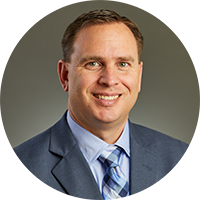Control Costs to Prevent Stop Loss Claims

by Scott Geyer, SVP, Client Services
There are many advantages to self-funding group health plans, but there are some large potential challenges, in the form of high unexpected claims, that can potentially threaten the stability of the plan. That’s where having the right stop loss partner is essential and having a plan administrator that can reduce the cost of caring for high-risk members becomes a critical success factor.
Having the right stop loss coverage helps plan sponsors sleep at night. Stop loss, or re-insurance, protects self-insured plans from unexpected claims that exceed the plan’s budget. There are a couple different kinds of stop loss coverage: specific and aggregate. Specific coverage protects plans from high claims against a single member with high-cost conditions. Aggregate coverage kicks in when the sum of all eligible claims paid, less any specific reimbursement made is greater than the stop loss aggregate minimum point or the sum of the monthly loss fund. In general, the higher the threshold, the lower the premium for the coverage. And as you might expect, keeping control of plan claims is the best way to keep the stop loss premiums affordable.
For most plans, fewer than one percent of cases account for 25 percent of the plan’s overall costs. Timely intervention to manage clinical care for members with high-cost conditions and the use of specialty medications can help improve the outcomes for the member and costs to the plan. HealthSmart offers effective solutions for both of these elements.
One thing HealthSmart does to help plan sponsors limit their potential exposure to stop loss claims is to actively manage the care of members diagnosed with or at high risk from serious, rare and chronic conditions that can create catastrophic claims. That’s important because “rare” diseases are defined as conditions that impact fewer than 20,000 Americans a year. But there are more than 7,000 conditions that meet those criteria, and together, they affect nearly 30% of the population.
And it’s not just rare diseases that can be a problem. Diabetes, for example, is extremely common, and can be quite expensive. The American Diabetes Association estimates $327 billion in total cost of diagnosed diabetics in the United States, which includes $237 billion for direct medical costs and $90 billion in reduced productivity. In worst cases, diabetes can lead to chronic kidney disease and ultimately End Stage Renal Disease, which must be treated by ongoing regular dialysis or by kidney transplant. Both of those options are expensive. In all cases, a diagnosis of diabetes puts a patient at very high risk of developing heart disease, circulation problems that can result in amputation and other serious health issues.
For example, HealthSmart’s
Specialty Case Management services have a proven track record of handling of the care of members with severe, rare or chronic diagnoses, creating savings that can range into the hundreds of thousands of dollars. Our Care Management team reduced the number of ER visits by members with chronic kidney disease (CKD) by 35 percent and achieved a 47 percent reduction in hospitalizations per 1,000 of population for members diagnosed with CKD.
Download our infographic for details
A major contributor to plan costs is the use of specialty pharmacy. Specialty drugs can range in cost from hundreds to thousands of dollars per dose. A drug is considered a ‘specialty’ drug when it is complex to administer, e.g., infusion therapy, has potentially severe side effects that require medical monitoring or frequent adjustments in dosing. These drugs are typically prescribed to treat severe, chronic or rare conditions. As a class, they are the fastest growing type of medication coming into the market, and of the new drugs in development, a growing percentage fall into this category.
HealthSmartRx Solutions is a full-service Pharmacy Benefit Management program. We offer a wide range of services to help clients manage their drug costs, including innovative approaches such as
Smart RxAssist. Most specialty drug companies offer financial assistance programs to help patients afford the out-of-pocket costs associated with specialty drugs. Smart RxAssist works with plans to reduce the overall costs for both plans and their participating members. And our approach helps members whether the costs fall on the pharmacy benefit or the medical benefit, where most other approaches to financial assistance fall short. Best of all, there is no fixed cost for the plan to participate—our services are paid for based on a percentage of savings basis. You can learn more about
Smart RxAssist here.
But beyond helping plans cope with reducing costs via medical management and innovative financial assistance platforms, HealthSmart can help plans and their brokers strategically identify the best stop loss carriers for their needs. As one of the largest TPA’s in the country, with more than a million members covered in more than 500 plans, we have strong relationships with multiple premiere stop loss carriers and Managing General Underwriters, so we can help you chose the best options for your particular situation.
HealthSmart helps self-funded plans navigate the risks that create nightmares for plan sponsors. Learn more about how we can help your self funded plan. Contact us at
Sales@HealthSmart.com
About the Author
Scott Geyer was named Senior Vice President of Client Services for HealthSmart in 2019, with overall responsibility for HealthSmart client relationships.
Scott’s entire career has been focused on client service, beginning in 1997 with Wells Fargo Insurance Services as a customer account manager, claims supervisor and account executive. He had 15 years of service with Wells Fargo when it was acquired by HealthSmart in 2012. He continued his role with HealthSmart as account executive, soon being promoted to senior account executive, Vice President of Client Services, and most recently, Senior Vice President of Client Services. In all, Scott has been serving our customers for more than 23 years.
Scott holds a Bachelor’s degree in Social Science from the University of Charleston.